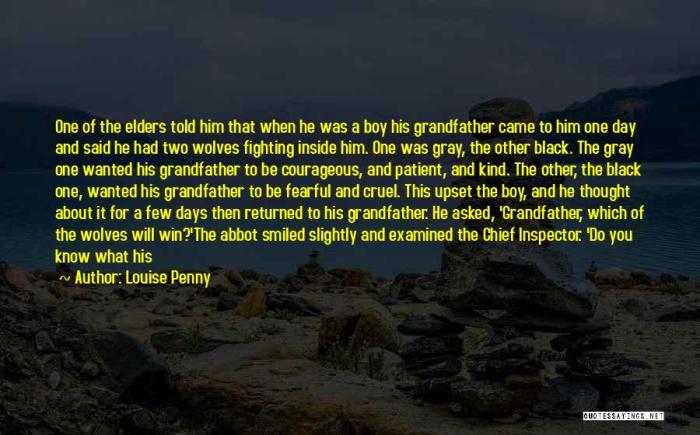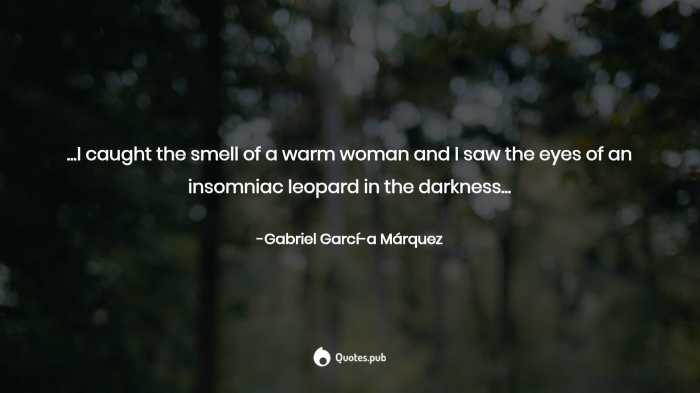Chronicle of a death foretold quotes – Delving into the profound depths of “Chronicle of a Death Foretold” unveils a treasure trove of evocative quotes that illuminate the novel’s intricate tapestry of themes, characters, and literary techniques. From the poignant musings on honor and family to the haunting exploration of fate and destiny, these quotes offer a profound lens through which to examine the complexities of human existence.
As we embark on this literary journey, we will unravel the significance of these quotes, tracing their impact on the narrative and delving into their profound insights. Prepare to be captivated by the wisdom and beauty embedded within “Chronicle of a Death Foretold,” as we explore the timeless themes that resonate with readers across generations.
Major Themes
Honor and Family, Chronicle of a death foretold quotes
In the Colombian society depicted in the novel, honor and family hold immense significance. Individuals are expected to uphold their family’s reputation at all costs, even if it means resorting to violence. The Vicario brothers’ actions, motivated by the perceived damage to their family’s honor, exemplify this cultural value.
Fate and Destiny
The novel explores the role of fate and destiny in shaping the characters’ lives. Santiago Nasar’s death seems predetermined, with numerous foreshadowing events leading up to it. The inevitability of his demise suggests that certain events are beyond human control and that destiny plays a crucial role in determining outcomes.
Isolation and Alienation
Santiago Nasar is a marginalized figure, isolated from the community due to his perceived arrogance and foreign background. His alienation contributes to his vulnerability and makes him an easy target for the Vicario brothers. The novel highlights the consequences of isolation and the importance of belonging to a supportive community.
Character Analysis

Santiago Nasar
Santiago Nasar is a complex and enigmatic character. He is portrayed as a charismatic and carefree individual, but also as someone who is arrogant and oblivious to the dangers surrounding him. His death serves as a reminder of the fragility of life and the consequences of hubris.
Angela Vicario
Angela Vicario is a victim of her family’s strict moral code. She is forced into a loveless marriage with Bayardo San Roman and is unjustly blamed for her husband’s abandonment. Her character highlights the plight of women in a patriarchal society and the devastating effects of societal expectations.
Bayardo San Roman
Bayardo San Roman is a wealthy and powerful man who represents the traditional values of Colombian society. His impulsive actions and desire for revenge drive the events of the novel. His character serves as a critique of the machismo culture and the negative consequences of toxic masculinity.
Literary Techniques

Foreshadowing
Foreshadowing is a prominent literary technique used throughout the novel. Numerous events and conversations foreshadow Santiago Nasar’s death, creating a sense of impending doom and inevitability. These foreshadowing elements contribute to the suspense and tension of the narrative.
Symbolism and Imagery
Marquez employs rich symbolism and imagery to convey deeper meanings. The rooster that crows at the moment of Santiago’s death symbolizes his innocence and vulnerability. The color white, associated with both purity and death, is used to highlight the contrast between Santiago’s life and his untimely demise.
Narrative Structure
The novel’s narrative structure is non-linear, with the story told in a fragmented and disjointed manner. This fragmented structure reflects the fragmented nature of the community and the difficulty of piecing together a coherent account of the events leading up to Santiago’s death.
Cultural and Historical Context: Chronicle Of A Death Foretold Quotes

Colombian Setting
The novel is set in a small Colombian town in the 1950s. The town’s social structure, customs, and beliefs reflect the patriarchal and conservative nature of Colombian society at the time. The novel provides insights into the cultural and historical context of the era.
Social and Political Issues
The novel touches upon several social and political issues prevalent in Colombia during the mid-20th century. It critiques the rigid class system, the oppression of women, and the culture of violence that permeates society. These issues are explored through the characters and events of the novel.
Cultural Traditions and Beliefs
The novel depicts various cultural traditions and beliefs of the Colombian people. These include the importance of honor, the role of the Catholic Church, and the practice of superstition. These traditions and beliefs shape the characters’ actions and contribute to the overall atmosphere of the novel.
Detailed FAQs
What is the significance of honor in “Chronicle of a Death Foretold”?
Honor plays a pivotal role in the novel, driving the characters’ actions and shaping their destinies. The Vicario brothers are compelled to avenge their sister’s perceived dishonor, even though they know it will lead to Santiago Nasar’s death.
How does fate influence the characters’ lives in the novel?
Fate is a pervasive force in “Chronicle of a Death Foretold,” shaping the characters’ lives and leading inexorably to Santiago Nasar’s demise. Despite numerous warnings and opportunities to intervene, the townspeople are unable to prevent the tragedy from unfolding.
What is the theme of isolation and alienation in the novel?
Isolation and alienation are prevalent themes in the novel. Santiago Nasar is an outsider in his own community, due to his Arab heritage and his affair with Angela Vicario. His death further alienates him from the townspeople, who are unable to comprehend or empathize with his fate.